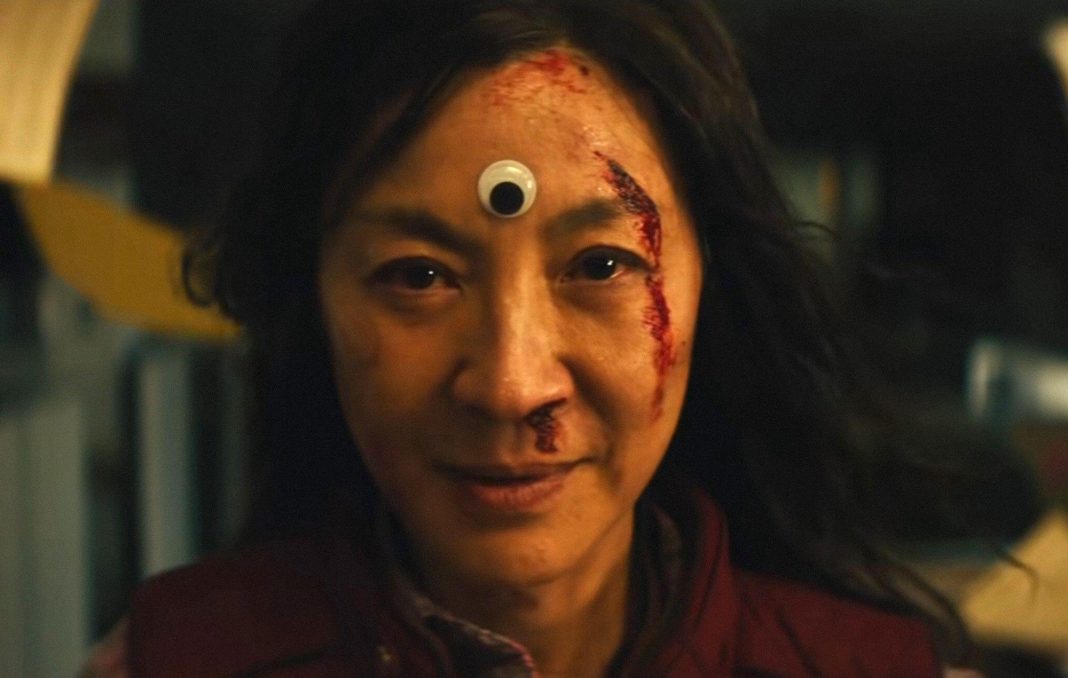
13 Dec Everything Everywhere All at Once Will Win Best Picture
Since 2015, when Todd McCarthy’s Spotlight won Best Picture, there has been a constant among the films the Academy has awarded with their highest honor: a sociocultural awareness. This is not to say the Academy’s desire to choose a socially aware film to represent what they believe to be the best of the year is new, far from it. In 1968, a famously landmark year for American political activism that saw major leaps in the public consciousness’ awareness of movements promoting anti-war sentiment, civil rights, women’s rights, LGBTQ rights, etc., the Sidney Poitier-starring In the Heat of the Night was declared the Academy’s winner. It’s no accident that a film featuring a white and Black man working together to solve a murder case in a racist contemporary Mississippi town won in a year where societal cognizance about injustices towards minority and marginalized groups was at a peak. All of this is to say that when political passion is at a high, Academy members do tend to lean towards media that they feel reflects and/or represents the sociocultural awareness they want to see.
Now for almost a decade, American culture has experienced an incredible amount of political passion and polarization and while this politicization has seen highs and lows during this timeframe, it has consistently been higher during this period than it has been in around 50 years. What this means is that the Academy choosing films like Spotlight (a film that celebrates journalists by telling the story of the intrepid Boston Globe reporters who uncovered widespread sex abuse among clergy in the Boston area), Moonlight (a coming-of-age story charting the early life of a young gay, Black man dealing with his identity), The Shape of Water (a love story between a deaf woman and a fish man, conveying the message that everybody deserves love no matter how different they seem), Green Book (a buddy film telling the story of an Italian-American bouncer hired to drive an African-American pianist on his tour of the South), Parasite (an examination of class discrimination through the lens of a home invasion thriller), Nomadland (a film that tells the story of a woman who, after losing everything in the Great Recession, becomes a nomad), and CODA (the story of a deaf family and their daughter who works to pursue her passion for music) is telling. Now I don’t enjoy reducing these films to these short descriptions because the majority of them are fantastic works of art that transcend these easy attempts to identify what they’re about, but I only hope to illustrate that they all share a level of consciousness over contemporary sociocultural issues.
This trend shows no signs of stopping anytime soon and therefore we must consider this factor when prognosticating our Best Picture winner. At this point in the season, we’ve established that our three frontrunners are Everything Everywhere All at Once, The Fabelmans, and The Banshees of Inisherin. These films have appeared at all the major precursors, they all have the Golden Globe nomination trifecta, and have found success with the critics’ groups. However, in my eyes, Everything Everywhere All at Once leads the pack. Both The Fabelmans and The Banshees of Inisherin don’t explicitly deal with any major sociocultural dilemma while EEAAO tackles themes of generational trauma and the experiences of immigrants (and their children) in America. On top of that, the film is probably one of the biggest word-of-mouth successes of the year and has sustained its momentum all the way from its original theatrical release in March.
Some may say that the old guard of the Academy won’t go for a film as wacky, deeply genre, and/or crude as EEAAO. But if the success of films like The Shape of Water, Get Out, and Parasite have shown anything it’s that these elements are not as much of a detriment in the eyes of the Academy as they used to be. If a film is beloved enough, which EEAAO most definitely is, it forgoes the need to conform to many of the traditional markings of a Best Picture winner. In my view, the film has the perfect cocktail of qualities on its side and doesn’t seem to be stopping anytime soon. Don’t be surprised to see the Daniels and the rest of their team on the stage waving that little gold man at the end of Oscar night.
